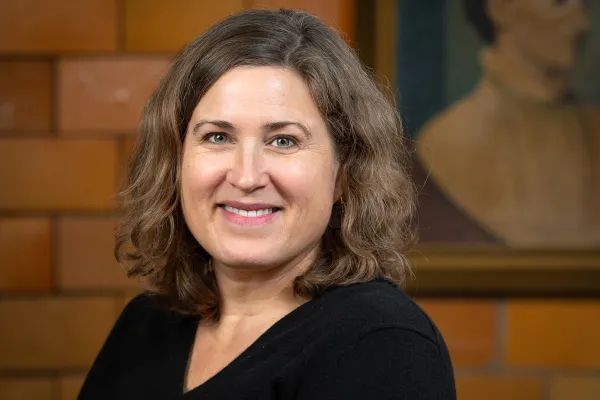Sarah Turner ’93 Leads the Country’s Oldest Crafts and Trades School into the Future
Alum News

Published March 5, 2019
Sarah Turner ’93 hasn’t been president of the North Bennet Street School (NBSS) for too long, but as a studio metalsmith with an impressive background in arts education administration, she can already tell that the position is a perfect fit.
Located in Boston’s North End, NBSS is the oldest crafts and fine trades school of its kind in the country. Founded in 1881 to teach employable skills to immigrants, NBSS offers full-time specialized programs, such as violin making, preservation carpentry and bookbinding, as well as more well-known trades courses like cabinet and furniture making and jewelry making and repair.
The school is fully accredited by the Accrediting Commission of Career Schools and Colleges. To attend, students must have a high school education or equivalent, but the NBSS student body is made up of recent college graduates, career changers of all ages and veterans. Roughly 160 students are enrolled in nine full-time programs. Another 800 students a year take advantage of evening programs geared to the general public. The school also has partnership programs with the Boston public school system.
Turner, who had been dean of the graduate program at the Cranbrook Academy of Art, where she also earned a master’s in metalsmithing, talks about NBSS’s mission, how it fits into the greater landscape of higher education and why her Smith education offered her a great foundation for leading the North Bennet Street School.
Higher ed: One size does not fit all
It’s interesting to be sitting in a trade school in Boston, one of the leading cities in this country for education and innovation in higher education. Yet a four-year college is not the right choice for everyone; in the case of career changers, maybe it had been the right choice at the time, but now they want something else. North Bennet is a school that trains students in a specific skill for employment.
In search of tradespeople
There has been a decline in the number of tradespeople in this country. And yet over the next five years, it’s estimated that up to 70 percent of the trades-based jobs are going to go unfilled. That’s partly because people are retiring out of those trades, and we haven’t emphasized this type of education. A four-year degree has been the basis for success in a lot of people’s minds. I think we’ve narrowed our vision about other ways to succeed and other ways to have an education and to build a life and a livelihood.
‘A quiet force'
North Bennet is, in many ways, a quiet force and a quiet education. I say that because we often play a behind-the-scenes role in the cultural life of our city. For instance, the Boston Public Library rare books and manuscripts collection hires our bookbinding students and alumni to work in its collection. Our students and alumni tune pianos at Tanglewood for the Boston Symphony Orchestra, and they also tune pianos for the Boston public schools. Our carpentry students have built food lockers for a shelter in Dorchester, and our cabinet and furniture program students helped to restore and rebuild furniture at the Old State House. North Bennet does this great work that people don’t necessarily know about.
Wanted: leaders and entrepreneurs
To identify that you want to be a furniture maker or a bookbinder takes a fair amount of self-initiative right off the bat. And then folks here are keenly aware that in order to support themselves through these occupations, they have to be leaders, they have to be entrepreneurs. We do offer businesses courses, and this idea of entrepreneurship is threaded throughout the curriculum because our faculty are practitioners working in their fields.
A renewed interest in maker culture
I don’t think we have always valued hand skills in this country. We haven’t always valued a physical, material, building-and-making kind of intelligence, and that’s around class issues, social issues and social strata. This country hasn’t always valued that as a mode of education.
And now …
The pendulum is starting to swing the other way. We want a return to things made by hand, knowing the origins of products, knowing where their source is, knowing that it’s a small and/or local business. I see that in the culture, and it makes me optimistic about what we are doing.
In the company of women leaders
One of the things I remember so much about being a student at Smith is that there weren’t academic requirements outside of your major. The open curriculum made a big difference to me because I felt like I had a lot of authorship, but I also had a fair amount of responsibility for the quality and the course of my education. And I realize the value of being with a group of women leaders. It feels normal and right to be a woman and a leader. Smith gave me that.